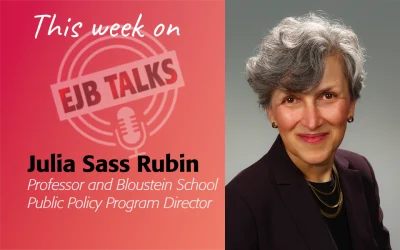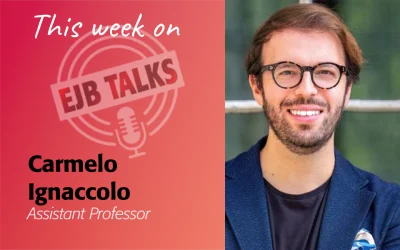On this episode of EJBTalks, Stuart Shapiro welcomes South Bronx raised, and fellow Yankees fan, Distinguished Professor Mike Greenberg. They discuss his illustrious career from professor and researcher to the Dean’s office at Bloustein. Mike talks about the foundations of the school, how its multidisciplinary, interconnected programs in health, urban planning, and public policy are the reasons for its success, and how the interaction between the disciplines creates versatility and the ability to rise to complicated societal challenges. The two also take a deep dive into the National Environmental Protection Act, with Professor Greenberg describing his shock at how it came to be. He also discusses the past and current challenges NEPA faces politically and administratively. Mike shares with Stuart his greatest joy through his career; watching faculty and students develop, succeed, and advance in prestige both locally and nationally.
Stuart Shapiro
Welcome to EJB Talks. I’m Stuart Shapiro, the Associate Dean of Faculty at the Bloustein School, and the purpose of this podcast is to highlight the work my colleagues, and our alumni in the fields of policy, planning, and health are doing to make the world the country and New Jersey a better place.
In our continuing series of talking with recently retired and retiring faculty, today, I’m honored to be speaking with Distinguished Professor Mike Greenberg. Mike used to hold my job as Associate Dean and has also served as the interim dean of the school. We’ll take a long time to sum up everything Mike’s done, but in short, I’ll just say there’s little at the Bloustein School that Mike hasn’t done in his career here. Mike, thanks for joining us.
Michael Greenberg
It’s my pleasure.
Stuart Shapiro
So let’s go back to your origin story here. How did you end up at the Bloustein School?
Michael Greenberg
Well, I always wanted to be at Columbia University. And so I got a job at Columbia University. Unfortunately, the dean at that time, decided that the subjects I was interested in, were not interesting to him. And so he told me afterward, I would never get tenure at Columbia. So I was recruited by Rutgers and came to Rutgers. Notably, the same dean, who is now deceased, apologized to me publicly at a meeting, saying he made a mistake.
Stuart Shapiro
Well, Columbia’s loss was our gain, that’s for sure. So really, more than anyone, I think, in my time at Bloustein School, you’ve championed the idea that public health, urban planning, and policy are really all pieces of a greater whole. Why do you feel that way? Why do you feel they all really do belong together in the same school?
Michael Greenberg
As you know, I was brought up in the South Bronx, about a 10-minute walk from Yankee Stadium, with a population density of about 80,000 people per square mile. And this was a working-class neighborhood. And when people needed help, they didn’t care what stove pipe you in, they just wanted help. So for me, yes, there’s a field called public health, there’s a field called health administration, there’s a field called planning, there’s a field called policy, a lot of different fields. So I always came at it from the point of view, it’s our responsibility to put together a really good set of faculty who can address as speakers and as researchers, topics that real people care about, which means building multidisciplinary, interconnected programs and people. That’s where it came from.
Stuart Shapiro
That’s, that’s great. And I will tell viewers that Mike’s proximity to Yankee Stadium means that we spend much of our time at the Bloustein School, Mike and I talking about the Yankees, but we’re not going to bother all of you with that.
One area where these disciplines do come together as a subject you and I have worked on together. Can you talk about your history with the National Environmental Protection Act?
Michael Greenberg
Yeah, I was around then, and when Richard Nixon signed the act, I thought it was a joke. I didn’t believe it. First of all, the United States, which epitomized capitalism, actually makes a statement, talking about considering environmental protection, and making decisions. And the fact that Nixon, a Republican, then put several other Republicans in charge of the Council on Environmental Quality, established the EPA with a Republican charge of it.
I was completely shocked. I’ll put it that way. I had a six-month period of shock. But knowing that this was real, that this was actually happening. So, that’s where it started. Earlier, five to six years earlier, a lot of people including myself, were working on a lot of issues. But to have the U.S. Federal Government, come out, make this statement, require environmental impact statements, and write a preface to the National Environmental Policy Act–which is the definition that most of us use for sustainability–was a stunner for me back then.
Stuart Shapiro
So can you talk a little bit about what the Act does and how it has changed the way we think about the environment as we make policy,
Michael Greenberg
The act really has two significant parts to it. The first part is a very, very short preface, which essentially defines that the United States federal government is now on record as saying that environmental protection and sustainability, which of course they didn’t call back then, but environmental protection and sustainability are an objective for the United States federal government. That is a critical part. But the implementation is a part that you and I have worked on a lot, as have other people.
So the United States set forth a regulatory process in which if you were proposing something of significance at the federal level if you were getting a permit from the federal government, and about five or six other things, actions that you wanted to take if you’re proposing to take these actions, you have to do an environmental impact statement. Which in essence says you have to figure out what is the action we’re proposing? What are some alternative actions that you could take? What would be the environmental impact of these actions? And what could you do to mitigate those effects that you were going to produce? And this worked its way through the court system. Has many, many court hours of interpretation of what’s required. But the essence of it is, hey we’re the United States government, and now we are going on record as saying that consideration of environmental protection is important to us.
Stuart Shapiro
Why is that such a big deal? Why is that, you know, in a way, almost revolutionary?
Michael Greenberg
At the time, it was revolutionary, because nobody did it. So the United States Environmental Protection Policy put forth in this Act has been emulated by over 100 other countries. And it is probably the single most emulated piece of legislation ever in the history of the United States. So for today, everyone assumes that it’s there, but it wasn’t there, back in 1970.
Stuart Shapiro
And now we’ll fast forward to the present and pick up on that point. I mean, people assume it wasn’t there. There was a sort of real effort by the Trump administration to seriously change the implementation of NEPA. Can you talk a little bit about that attempt?
Michael Greenberg
Sure. Basically, the Trump administration decided that NEPA was an attorney’s employment act. And what would happen is when somebody would propose something, that environmental groups did not like the environmental groups, would argue against it, take it to court. And a project with the Trump administration decided it should two years, could still be in the courts and still being battle on for five years, 10 years, and in several cases, you know, even 20 years. And so then he put out, essentially, a hit on NEPA, and they were proposing radical changes, that things had to be done within a couple of years, they have to be done with minimum challenges. You couldn’t bring in new topics, like sustainability, and they really were taking a hatchet to it. And although I know and you know that the act, and the law and the regulations needed some revision. There had been revisions occurring for many, many years. Yet, they weren’t satisfied, they were gonna just axe it.
Stuart Shapiro
So it’s not as if NEPA really couldn’t be improved. But the problem is that, as you said, there was a hatchet being used when really a scalpel was probably what’s necessary.
Michael Greenberg
Yes, I agree. Scalpel is the right word. Yeah.
Stuart Shapiro
I mean… what are some of the things you would fix about NEPA?
Michael Greenberg
Well, I think that, because some of the proposals take so many years to build, it’s a little unfair to have something approved under one presidency and four years later, you get a new president, and the president decides he or she doesn’t like it. And so they stop it, after some company, or some other government has already spent billions of dollars in investments. So leaving people hanging out there is very, very troubling to me. Second, I do think that the documents, which are originally supposed to be hundreds of pages long, starting to become 1000 pages long. And when we’re not providing all the information that was needed to make a decision. They were providing so much information, too much information, people got drowned in numbers.
Stuart Shapiro
Yeah. Now that’s one of my bugaboos about the act as well, is that what’s happened is we get these impenetrable documents and if NEPA is supposed to help transparency, a 1000 page document does not help transparency.
Michael Greenberg
Yeah, I mean, I just to give the listeners a sense. I wrote about a 150-page piece of a NEPA document. The document was so thick, it was about a nuclear power plant that they had to woo it in on one of the old-fashioned library cards. That’s how big it was. It was thousands and thousands of pages long.
Stuart Shapiro
Yeah, indeed. I want to turn to another issue that probably will resonate with some of our younger viewers the issue of environmental justice. Can you talk a little bit about how a school like the Bloustein School that incorporates policy planning and health is really kind of fit to deal with environmental justice and how a good dealing with environmental justice requires all of those perspectives?
Michael Greenberg
There’s nothing really simple about environmental justice. It’s actually quite complicated. And in order to study something properly, you need people that understand ethics, you need people that understand science issues, social science issues, issues around sociology, issues around land use planning. It really is, the whole idea of environmental justice fits the Bloustein School very, very well. We have a lot of multidisciplinary thinking faculty, and we’re a really perfect group to work on it.
Stuart Shapiro
And where do you see sort of our national dialogue and environmental justice going in the next couple of years? I mean, the Biden administration has talked about making it a priority. What do you think is going to happen?
Michael Greenberg
Depends on who the next president is. But there are things for the next few years, while Biden is president, you can expect an intensification of requirements for U.S. federal agencies, and in order to receive funding. And we can expect the Biden administration to tell federal agencies like the Department of Defense, the Department of Energy and others, that they have to accomplish certain environmental justice-related tasks. And as you know, I’ve been working on that, for the Department of Energy. I’m working on it right now and have been working on it for the last few months.
Stuart Shapiro
So is it fair to say as much as NEPA, kind of forced agencies to think more about the environment and incorporate it into their decisions, what the Biden administration hopes we see in the years ahead, is incorporating environmental justice into more government decisions?
Michael Greenberg
That’s true. And it’s actually happening right now. I mean, as we’re speaking this is happening.
Stuart Shapiro
Well, that’s encouraging. It’s always nice to see the things we talked about in the classroom move out into the real world there.
Michael Greenberg
I can give some examples of that.
Stuart Shapiro
Yeah, please do.
Michael Greenberg
So you’re a big organization like the Department of Defense or Department of Energy, and the Biden administration tells them that they have to start environmental justice programs at some of their locations. And so one of the things I’ve been helping the Energy Department with is at its very large locations, what is the on the ground evidence that we have, that they have environmental justice and social justice issues in the area? So I’ve been doing, and just gave them a report that we did on environmental and social justice challenges at the Department of Energy sites.
Stuart Shapiro
And that presumably, will lead to or will influence decisions on those sites.
Michael Greenberg
We’ll see. I mean, they have to make a choice as to what places they want to emphasize, what communities near their sites they want to emphasize. And they’re working on this right now. The last talk I had with them was last Friday.
Stuart Shapiro
So let’s kind of, as a wrap-up, think back to your time at Bloustein. It’s obviously been a long time. What do you look back at most fondly? What are you most proud of?
Michael Greenberg
I think Bloustein, what it was before it was called Bloustein, has given me an opportunity to kind of live out a dream of how I like to do things. And I think you’ve been asking me about that. Basically, I am a real believer in working with people from different disciplines, all of who are very smart, but you put their brains together and they become exponentially smarter. It’s amazing how this works. So I’m very pleased with the way it’s worked out. And this may sound a little corny, but the reality is when I was Associate Dean and then Dean for a short period of time, hiring people like you, watching you develop, and watching you all succeed and move up in prestige, both within Rutgers but especially nationally, that’s a total blast for me. And as I said to the students and the faculty, I get to brag about your accomplishments. It’s wonderful for me, I love it.
Stuart Shapiro
Well, there’s not anyone, any faculty member, including the many we’ve talked to on this podcast, who doesn’t owe a debt of gratitude to Dean Greenberg there. And both. Both are of course hiring and mentoring of us and also his example of bringing the kind of work he does in his research out to the real world in the way that he’s described there. So thanks, Mike, and thanks for coming on the podcast.
Michael Greenberg
It was my pleasure, Stuart. Go Yankees!
Stuart Shapiro
((laughing)) That’s an editorial comment I’m going to allow to stay in there.
So a big thanks to Mike and of course also to our production team Amy Cobb and Karyn Olsen. We’ll see you next week with another talk from another expert at the Bloustein School until then stay safe.




